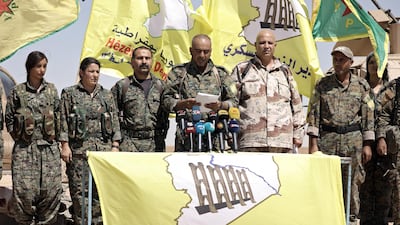US-backed forces and the Syrian army advanced in separate offensives against ISIL in eastern Syria on Saturday.
The Syrian Democratic Forces, a US-backed coalition, aimed to push out the jihadists from territory east of the Euphrates River, while Syrian government forces — supported by Lebanese group Hizbollah and Russian air power — seized an oilfield from ISIL on the other side and recaptured part of a road linking Deir Ezzor to ISIL-held territory downstream.
Ahmed Abu Khawlah, who heads the SDF's Deir Ezzor Military Council, read a statement in a press conference in the village of Abu Fas in Syria's northeast Hasakeh province.
He said his forces started fighting to flush out ISIL from territory in Hasakeh province and further south in the strategically vital province of Deir Ezzor.
"Pivoting towards Deir Ezzor was inevitable … We are taking the first step to liberate territory east of the Euphrates River in Deir Ezzor," Abu Khawlah told AFP.
The Syrian government said its troops were attempting to break a nearly year-long ISIL siege on a military airport on the south-western side of Deir Ezzor.
The Syrian army’s push in to the city has allowed aid shipment to reach civilians via land for the first time in years. For more than a year, the World Food Programme has been airdropping supplies to besieged areas.
Ingy Sedky, a spokeswoman for the International Committee of the Red Cross in Damascus, said hygiene kits, food parcels and medicine were delivered for 80,000 people.
"What we hear is that there is a lack of food and that the humanitarian aid that was provided before by airdrops was insufficient," Ms Sedky told The National on Saturday.
Meanwhile, the US-led coalition fighting ISIL said on Friday that it ended its surveillance of buses carrying militants in eastern Syria after a request from the Russian government.
“To ensure the safe de-escalation of efforts to defeat ISIS, coalition surveillance aircraft departed the adjacent airspace at the request of Russian officials during their assault on Deir Ezzor,” the US Central Command said in a statement.
Eleven buses had been stranded in eastern Syrian for more than a week after the US sought to block the transfer of ISIL fighters from the Lebanese-Syrian border to Al Bukamal, an ISIL-controlled city near the Syrian-Iraqi border.
The US and members of the Iraqi government said the deal — negotiated between the jihadists and Hizbollah — would allow them to cross the border into Iraq and join other ISIL fighters there.
The convoy had been stalled at the border of ISIL-controlled territory and the Assad forces’ front line, but that line has moved further east into ISIL-controlled territory in recent days as the Assad forces, supported by Russian and Syrian air power — are now fighting on the outskirts of Deir Ezzor.
"The regime's advance past the convoy underlines continued Syrian responsibility for the buses and terrorists,” said Brig Gen Jon Braga, director of operations for the coalition. “As always, we will do our utmost to ensure that the ISIL terrorists do not move toward the border of our Iraqi partners.”
On Friday, Lebanon held a state funeral for the 10 soldiers who were killed by ISIL. Their bodies were recovered after at least 300 ISIL fighters withdrew last month from northern Lebanon to Syria, where they boarded buses that were to take them to Al Bukamal.
Families of the 10 soldiers have expressed frustration that no one from ISIL would be brought to justice.
“There was an evacuation deal, but there was no justice component. There were people who had committed crimes — executions — and they get a free pass,” said Nadim Houry, Human Rights Watch's director of its terrorism and counterterrorism programme.
The US-led coalition bombed roads to prevent the buses from reaching Al Bukamal, killing more than 80 militants and threatening to kill anyone that strayed too far from the buses. There were also accusations that the US military prevented aid from reaching the stranded buses, which the US military denied.
“This convoy was probably half civilian,” Mr Khoury said. “We know for a fact that there were families and women and kids. And like so many civilians in Syria, they end up trapped between all these players.”

